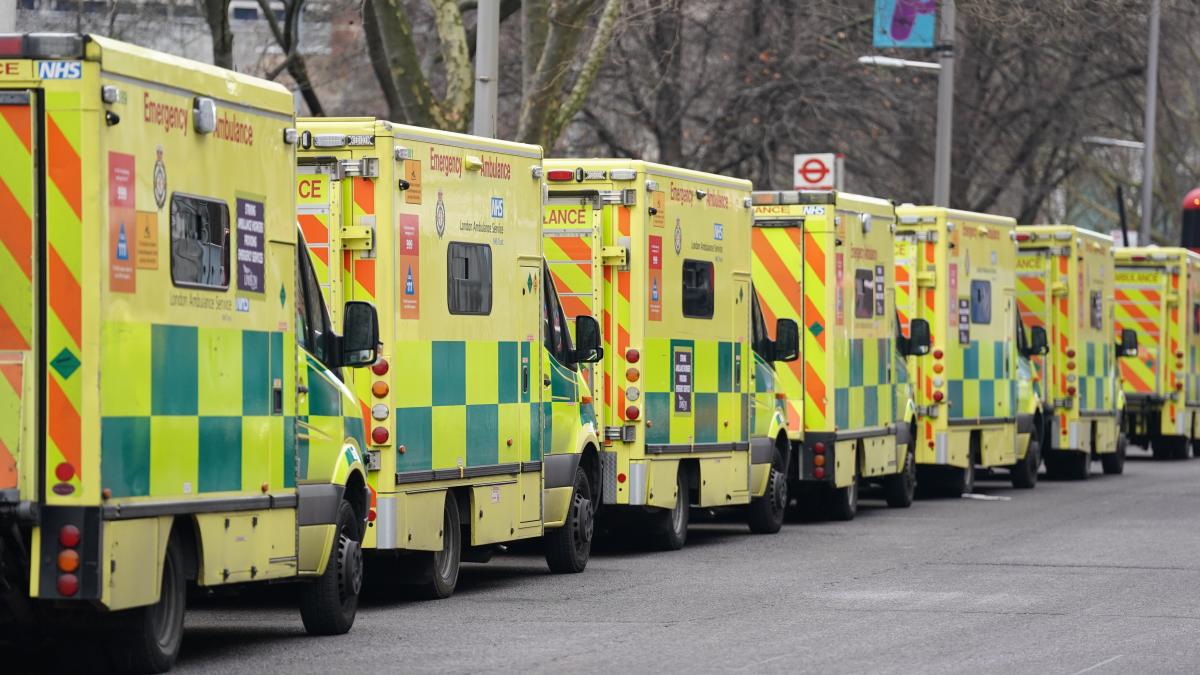Thousands of ambulance workers are staging a fresh strike on Monday in a long-running dispute over pay and staffing, amid an announcement of a vote by junior doctors for industrial action.
The GMB said more than 11,000 of its ambulance workers in England and Wales, including paramedics, paramedics and call attendants, will step out, with Unite union ambulance workers also on strike in parts of the country.
Young doctors at the Hospital Consultants and Specialists Association (HCSA) in England have announced they will go on strike on March 15 over a wage dispute for the first time in the union’s history.
Around 45,000 junior doctors who are members of the British Medical Association (BMA) in England were also voted to strike – the result is due to be announced on Monday.
Anticipating a big vote in favor of strikes, the BMA has already warned that if there is a yes vote, it will stage a three-day strike.
Meanwhile, officials at the Animal and Plant Health Administration (APHA) begin their second week of strikes.
Members of the Bristol and Carlisle-based Public and Commercial Services (PCS) union are taking action amid a long-running dispute over public sector salaries, jobs, pensions and conditions.
The union said strikes at APHA had already caused delays in imports and exports, including caviar.
A PCS spokesman said: “Ministers should be ashamed that while some members of society are complaining of a lack of caviar on their plates, 40,000 of their own staff are using food banks.
“Our members should not be forced to choose between heating and eating – they should be paid fairly for their important work.”
Rachel Harrison, GMB national secretary, accused the government of being “pirate”, adding: “It has been over a month since the government has had any meaningful dialogue.
“They are missing from action and refuse to talk about pay.”
The BMA’s senior doctor accused the Prime Minister of being “thoughtless and belligerent” in refusing to reach a workable agreement on pay and working conditions with NHS staff.
At a conference for young doctors in Bristol, BMA Chair Professor Philip Banfield said Rishi Sunak and Health Secretary Steve Barclay “are on the precipice of a historic blunder”.
He said the refusal to start meaningful negotiations with the unions meant the government was “guaranteeing an escalation” while the thought they could remain silent and wait was “reckless”.
Prof Banfield said young doctors deserve better and are not expensive for the expertise and skills they offer.
He accused the Government of “abandoning patients”, adding: “All NHS staff are committed to protecting our patients in a system that seems to have forgotten that valuing staff and their well-being is directly related to.” patient safety and better treatment outcomes.
Meanwhile, striking nurses are being paid 60% more than during previous strikes by the Royal College of Nursing (RCN), it has been revealed.
The RCN also said it has received £250,000 in donations from the public since it began its strike action for more pay in December.
Union increases daily picket rate from £50 to £80.
Nurses who have already been on strike for four days will be paid £120 a day as the RCN dives into a £50m fight fund ahead of an unprecedented 48-hour strike on March 1.
The net daily wage of a nurse with an average salary of £36,000 is around £135 assuming a four day work week.
A typical nurse who took part in all six days of the strike plus the two in March could theoretically claim £540 in strike pay – but has lost £1,080.
The RCN said the move aimed to bolster nurses’ resolve and undermine the government’s strategy of “waiting out the strikes rather than negotiating”.
Striking nurses at the picket line outside St. Thomas’ Hospital in London (PA)
Public support for striking nurses remains the highest of any striking worker, the RCN said.
The union said the decision to include ambulance services, cancer treatments and other previously exempted services has rocked NHS managers, who are calling on the government to settle the dispute or risk waiting times increasing significantly as tens of thousands of surgeries are cancelled.
Hospital trusts have been ordered to provide NHS England with a risk assessment of next month’s strikes by midday on Monday.
A Department for Health and Social Care spokesman said: “We value the work of junior doctors very much and we have made it clear that supporting and retaining the NHS workforce is one of our main priorities.
“As part of a multi-year contract that we have agreed with the BMA, the remuneration of the residents has increased by a cumulative 8.2% since 2019/20. We’ve also introduced a higher salary range for the most experienced employees and higher rates for night shifts.
“The Secretary of Health and Human Services has met with the BMA and other medical unions to discuss pay, working conditions and workload. He has made it clear that he wants to continue discussing how we can make the NHS a better place to work for everyone.”
Don’t miss interesting posts on Famousbio
